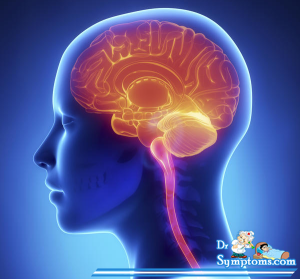BRAIN TUMOR OR CANCER OF CNS
A brain tumor is a proliferation of tissue of the brain. Brain tumors can be benign or malignant, but generally employ no secondary >>tumors in other organs. They usually arise from the nerve supporting tissue (gliomas / astrocytomas) or the pituitary gland or secondary >>tumors from other organs that resettle in the brain and grow here.
Brain tumors can be benign (delimited, slow) or malignant (infiltrative, quickly, metastatic) in growth. Brain cancers grow infiltrative, meaning they are not separate from surrounding brain tissue . After surgery, individual cells may remain in the border area, which can then grow back. Furthermore, brain tumors can grow in areas of the brain that are not surgically accessible.
Brain tumors represent about 2 percent of all cancers. Therefore, in contrast to cancers of other organs such as breast, prostate or colon brain cancer is comparatively rare. >>Tumors of the brain can occur at any time and regardless of age, however, be observed more frequently in people between 50 and 70 years. Men are affected on average slightly earlier than women (64 versus 68 years
The most common brain tumor in children are the astrocytoma. Astrocytoma is slow growing >>tumor. Astrocytoma is >>tumor of CNS or brain which arise from “glue-like” or supportive tissues of brain celled astrocytes. Astrocytoma is most common brain tumor develop in children at ages of 5 to 8 years.

BRAIN METASTASES
Another not yet scientifically understood, peculiarity of brain tumors is that they rarely cause metastases in other organs. Even very malignant tumors such as gliomas or medulloblastoma usually remain limited to the brain. Only rarely, the spread of individual tumor cells via the cerebrospinal fluid may develope new tumors at distant locations within the CNS.
Approximately 30 to 40 percent of all brain tumors are arise as metastases from other tumors. Some tumor cells come in brain with the cerebrospinal fluid (CSF) and become established here. The following malignant tumors tend to develop brain metastasis:
- Adenocarcinoma of the lung
- Breast cancer
- Bladder cancer
- Thyroid carcinoma
- Malignant melanoma
- Tumors of the gastrointestinal tract
- Tumors of Lymphoma.
Classification of Brain Tumor
Primary tumors of the brain and spinal cord comprise a wide variety of different types of tumors that originate from different cells of the nervous system and vary considerably in terms of their growth behavior, response to treatment and prognosis. The exact classification (classification) of different tumor types as well as the assessment of their biological value, that is the distinction between benign or malignant tumor, is based on histological features that needs preparations of the tumor tissue under the microscope.
This requires the extraction of tumor samples, either through open surgery or stereotactic biopsy.
WHO give four grades of tumor of central nervous system. The WHO grade I corresponds to a benign, slow-growing tumor with a favorable prognosis and good chance of cure by surgical removal of the tumor. In contrast, the WHO grade IV is awarded for malignant, rapidly growing tumors with a poor prognosis with the currently available methods of treatment (surgery, radiotherapy , chemotherapy is usually not curable).
WHO grading of tumors of the nervous center
WHO grade I
Benign tumor, slow tumor growth, very good prognosis.
WHO grade II
Increased tendency to relapse education, transition into malignant tumors is possible.
WHO grade III
Malignant tumor, after surgery radiotherapy and / or chemotherapy is necessary.
WHO grade IV
Very vicious, rapid tumor growth, after surgery radiotherapy and / or chemotherapy is necessary, poor prognosis.
TYPES OF BRAIN TUMOR
There are many types of Brain tumors or CNS tumors (Click on given types for more information about each type):
BRAIN TUMORS: CAUSES AND RISK FACTORS
The causes of brain tumors are largely unknown. However, there seems to be some factors that increase the risk of brain tumors.
Following causes or risk factors might be involved in the development of a brain tumor:
- Brain tumors may occur after a previous cranial irradiation.
- Also, there may be a family history of this disease. Certain genetic changes, like the Turcot syndrome, Li-Fraumeni syndrome or tuberous sclerosis as may proven to contribute to cancer development.
- Various noxious chemicals such as vinyl chloride exposure and petrochemicals will be discussed as a cause for the development of these tumors.
- An influence of electromagnetic radiation (eg from electricity pylons and radio telephones) has not yet been demonstrated.
- Certain methods of treatment – such as radiation therapy – for example, for the treatment of childhood leukemia, can increase the risk of malignant brain tumors
- A computed tomography (CT) slightly increased the risk, to develop a brain tumor in childhood.
BRAIN TUMOR: SYMPTOMS
- Initial symptoms of a brain tumor are usually uncharacteristic, these include Fatigue and reduction in physical performance.
- Headache occurs in about half of the patients, especially at night and early in the morning. During the day, the pain increases then decreases slightly. Headaches caused by a brain tumor take, may be prepared within a few days or weeks steadily and hardly suppress by painkillers .
- The headache may additionally be accompanied by nausea and vomiting.
- Further signs of a brain tumor may be
- Paralysis
- Blurred vision,
- Sensory disturbances,
- Speech and language disorders,
- Incoordination and impairment of reactivity.
- A restarted epileptic seizure can be an indication of a occurring of possible tumor of the brain.
- Also personality changes may represent effects of a brain tumor.
TREATMENTS OF BRAIN TUMOR
The treatment methods depend on tissue type of the tumor, the patient’s age and general condition and the size and location of the tumor in the brain.
Three different treatment options can be used alone or in combination
SURGERY
In the ideal case, which occurs very rarely, the brain tumor can be completely surgically removed without leaving tumor cells. Frequently it is possible only to remove a large part of the tumor. In some cases, such as poor general condition of the patient or unfavorable tumor location, even the removal of a small tissue sample (biopsy) may be possible to confirm the diagnosis.
SURGERY FOLLOWED BY RADIOTHERAPY WITH / WITHOUT CHEMOTHERAPY
Since in most cases no complete removal of the tumor cells is possible and vital structures of the brain would be hurt by an extended operation, an after-treatment by means of radiotherapy and / or chemotherapy is advised.
RADIATION THERAPY
A radiation therapy as first-line therapy is particularly used when the tumor is located at a particularly critical location in the brain and therefore only a biopsy, and no operation is possible. The number of radiation sessions and the irradiation intensity depend on the tissue type. During radiotherapy side effects such as head pressure, headache, nausea, hair loss and possibly fatigue may occur. However, most side effects can often be mitigated by the use of various drugs.
By irradiation, the risk of recurrence of tumor growth can be reduced. Even with far advanced cancer with large tumors or metastases, radiation therapy can be used for pain relief.
CHEMOTHERAPY
Chemotherapy alone, without surgery and radiotherapy, in most brain tumors shows a little effect. However, chemotherapy may be carried out simultaneously with radiotherapy, improve the the effect of radiotherapy. Chemotherapy can be continued after the end of irradiation is effective for tumor. Despite the use of chemotherapy after radiotherapy, if this is no longer possible, for example in the case of recurrence of a tumor, a symptom control (size stabilization or reduction in size) can be prepared by various substances and by various combinations possibly be achieved with tumor response.
The effectiveness of many known and newly developed substances are being studied in the treatment of brain tumors. It is generally advisable for patients with a brain tumor, to have these tumor-specific therapies from specialist physicians . Some of these therapies can be performed on an outpatient basis.
PRECAUTIONS FOR BRAIN TUMOR
Unfortunately, it is not known how to prevent a brain tumor. There is no living habits or specific risks that can be blamed. Brain tumor behaves differently as compared to other cancers, which are favored by about alcohol consumption or cigarette smoking. Certain risk factors as just radiation, pesticides and known carcinogens should be avoided so as to possibly prevent the risk of disease. Despite all the precautions and risks minimization brain tumor does cannot be prevent or effectively counteracted.
NOTE
When in doubt, you should always consult a doctor for such complaints. Earlier the cancer is detected, greater the chance of cure.
For more information about cancer:






